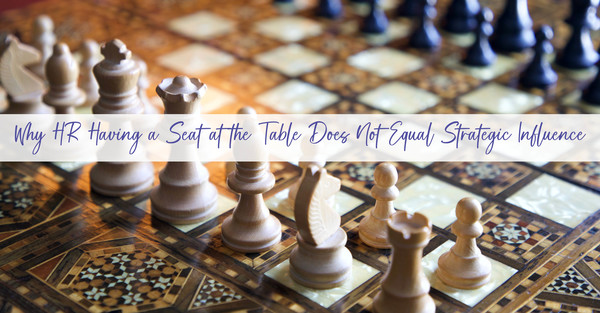Drop off your CV
We serve the global HR community through our offices located in Delhi, Hong Kong, London, New York, São Paulo and Singapore and have placed HR leaders in over 30 countries.
Written Dr. Jelena Petrovic Associate Professor of Strategic Leadership at Kingston Universi...

Written Dr. Jelena Petrovic Associate Professor of Strategic Leadership at Kingston University London and Chair of the CIPD SW London Branch.
People are an organizational resource essential to achieving and sustaining an organization’s competitive advantage, because their knowledge, skills and abilities are valuable, rare and difficult to imitate. This is the argument of the Resource Based View of the firm - a theory that explains investments in people. And following this, to achieve the “human capital advantage”, the business strategy needs an HR professional’s input. It is not just in theory however that the strategic role played by HR professionals is important. In practice, a recent shift in investor preferences towards environmental, social and corporate governance activities in organizations, with the ultimate aim of ensuring sustainability, has resulted in the C-suite increasingly looking to HR for strategic input. The word “strategic” immediately brings to an HR professional’s mind the role of the HR Business Partner and a seat at the boardroom table.
However, HRBPs are not automatically strategic partners, nor does having a seat at the boardroom table equal HR strategic influence. The issue may be in the interpretation of the word “strategic”. Some may think this is just a question of semantics. However when it comes to HR’s contribution to business outcomes, having the correct understanding of what “strategic” means becomes vital. For example, many HR professionals think that helping their organization achieve cultural change following a merger or acquisition is strategic. From an HR perspective, this process may indeed seem “strategic” because it entails carefully planning people strategy - various people practices aimed at ensuring that a newly created organization has people who have the right competencies, perform well, are satisfied with their jobs and are thus less likely to leave. At the end of the day, people are an organization’s valuable, but unpredictable, resource - their contribution depends on their willingness to perform and stay in the organization.
From a C-suite / board perspective, however, HR strategy is an operational matter. “Operational” does not mean less important; it just means a different focus with a different outcome: business strategy focuses on the entire organization and normally results in a repositioning of the company in the market; HR strategy focuses on the people aspect and is about making the business strategy happen – in this case, ensuring a smooth implementation of an M&A. Strategic in the above example thus means making a decision about whether to enter a merger or acquire another company. If HR influenced this decision, then it would be considered strategic. But if HR only implements such a decision, then it is operational. Strategy, therefore, is not about implementing business strategy; it is about creating it. Being strategic does not mean being confined to the boardroom table. Having a seat at the boardroom table would give the HR professional positional power but may not guarantee influence on business strategy.
There are effective ways of influencing strategy both inside and outside the boardroom, some of which are listed below: Demonstrate “strategic thinking” – understand what “strategic” really means (e.g., HR strategy is operational to business strategy). Have business acumen – an understanding of the organization’s strengths, risks, and unique priorities. Gather the right evidence – strategically important HR metrics – and integrate it in an organizational performance dashboard. Use your HR expertise and acknowledge that the organization’s value chain begins with people. Know your key stakeholders and build a network with them to better understand them (i.e., their backgrounds and psychological characteristics) and what they want (for example, establish what the CEO and/or NEDs look for and what the key issue is for them).
Understand the top team/board dynamics and how board decisions are made. Display strategic leadership qualities, ethical attitude, and political intelligence. Be willing to contribute! If an HR professional has a boardroom seat but not the above qualities, the chances are that HR will not provide strategic input. They will only convey the strategic decision to their team so that the business strategy can be implemented by creating an HR strategy (what is normally referred to as “aligning HR and business strategy”). However, if HR does have the above qualities but not the boardroom seat, they can still provide a valuable strategic contribution that is both emotionally compelling (people) and economically convincing (organization). Dr Jelena Petrovic is an Associate Professor of Strategic Leadership at Kingston University London and Chair of the CIPD SW London Branch. She is actively engaged in industry collaborations through consultancy and design and delivery of executive development programs, with a particular interest in HR professional influence in and around the boardroom and behavioural aspects of CEO pay.
Jelena can be contacted via LinkedIn at https://www.linkedin.com/in/dr-jelena-petrovic/